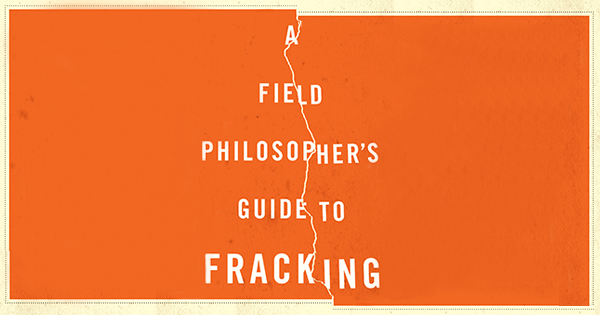A Field Philosopher’s Guide to Fracking
A brief excerpt from Adam Briggle’s new book about fighting Big Oil in Texas

What’s a young philosophy professor to do when he moves to a small college town crisscrossed with gas wells? If you’re Adam Briggle, you form an activist citizens’ group, Denton Stakeholder Drilling Advisory Group (DAG), agitate to pass a ban on hydraulic fracturing in Denton, Texas—and win. In A Field Philosopher’s Guide to Fracking, Briggle traces the intellectual journey he took with DAG to stand up to oil and gas companies, and how they navigated the various political, social, and environmental questions at the heart of fracking, literally, in someone’s back yard. Is independence from OPEC worth the price of having children play a foot away from a gas well that could blow at any minute? Do the economic advantages of local fracking outweigh the cost of livestock asphyxiating on toxic fracking fluids?
Briggle approaches these questions with a philosopher’s cool eye, drawing on the rich veins of philosophical inquiry, scientific research, and regulatory history to form an argument that won the popular vote for a ban on fracking.
Precaution is most often talked about in terms of a principle, though, rather than a state of mind. “The precautionary principle” is a translation of the German Vorsorgeprinzip, which means “fore-caring principle.” At its core, then, it calls for foresight, preparation, and taking more things into account prior to acting. If we commit to a technology and then wait for science to prove its guilt, it may be too late. Like Dr. Frankenstein, we could wind up lamenting our monsters after people have been harmed or killed or after the environment has been despoiled. When it came to fracking in Texas, we were just shooting from the hip, letting thousands of gas wells bloom with only the narrow intention of making money. Everything else—impacts on communities, air, water, seismicity, etc.—was boxed out of consideration the same way those cartoons and shiny museum exhibits box out the ugly undersides of fracking.
By the end of December, DAG’s conversations at Rhonda’s house had turned seriously toward the option of a fracking ban within the city limits. I was still skeptical […] Wasn’t it unphilosophical to cut the Gordian knot of such a complex issue with a simple “no, not here”? If I did this, how could I avoid being tarred with the brush of radicalism, dismissed for having plunged into the abyss of irrationality?
Then again, maybe to initiate a ban would be the most philosophical thing to do. Aren’t philosophers supposed to question laws and conventions, not work within their parameters? And aren’t we supposed to fight for the underdog? It also seemed to be a practical possibility. We had talked informally with some lawyers who suggested a ban on all drilling and production would not be legally defensible—but a ban targeted at the hydraulic fracturing stage, the most noxious part, could work. We had studied Denton’s charter, which allowed for a citizens’ initiative process whereby we could write our own ordinance, gather signatures, and put it up for a popular vote. It was a live option.
Excerpted from A Field Philosopher’s Guide to Fracking: How One Texas Town Stood Up to Big Oil and Gas by Adam Briggle. Copyright © 2015 by J. G. Ballard. With permission of the publisher, Liveright Publishing Corporation, Inc. All rights reserved.

